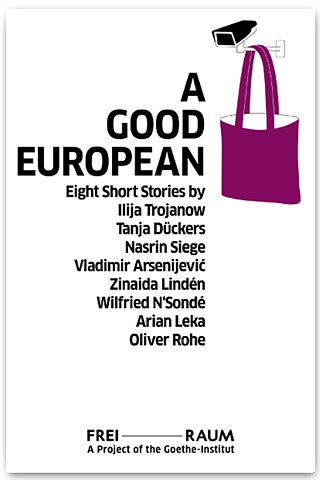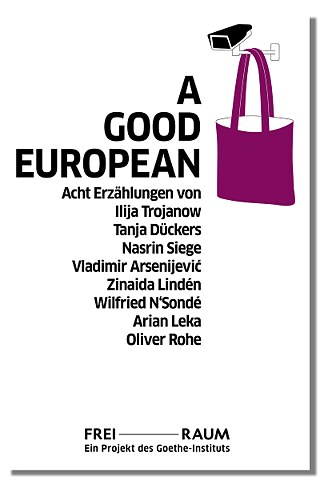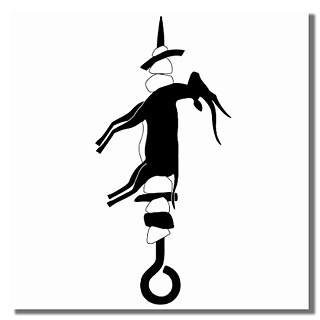Ilija Trojanow
Game for a Zoo
By Ilija Trojanow
Building a zoo is no easy task. Not for a small town out in the provinces. Especially not these days. What we have to help build is socialism, says the party secretary—not a zoo! There’s no arguing with the man, even if all we’re talking about is a modest little pen with a few roe deer and a couple of red stags, a few peacocks, some guinea fowl, mountain goats, and maybe a limping fox. So what are the odds of getting a real zoo, the kind I imagine day after day as I wipe down the wooden tables in the restaurant, eagerly waiting for spring to arrive, or as I sweep the floor dreaming of zebras and giraffes—and even an elephant when I’m cleaning out the gutter on the roof? When the first guests sit down on the patio overlooking the lake, order beers, gaze at the craggy knolls and stretch their limbs out into the early summer, a lion scampers through my mind. I shake my head slightly, almost imperceptibly, and go on serving kofta and kebabs the whole summer long, all the while dreaming away.

My dreams know how to be patient. The restaurant gets renovated, the terrace expanded, the meadow in front of the forest keeps growing wild and one day, for no reason at all and not due to any pressure, the party committee decides to act on my proposal and approves an animal pen on the north side of the lake. And what a joy that they’ve entrusted the task to me. As it happens I’m quite familiar with our country’s wildlife. Right away I manage to get hold of a few roe deer and one red stag, then five mountain goats a little later on. I buy a frail old dancing bear off a Roma man with a bad case of gout. By now it’s pretty impressive, the little pen with the native fauna. I plant bushes and trees, fill the water troughs, paint a few signs and call the vet from the provincial capital when the first roe deer gives birth. And every day I take my dream walk by the lake, never losing sight of what’s still missing, of what could transform this pen into a genuine zoo, something from very far away, something different, something like… well… for example… a giraffe.
—A giraffe? No problem, Uncle.
That from my nephew Grozdan, who’s done amazingly well for himself. He works in a ministry in the capital and comes to visit us once a year in his official car.
— What do you mean, no problem?
— You’re in luck, Uncle, and you’re luck has a name: Sekou Touré.
— Seeku Ture?
— No, Se-kou Tou-ré. Don’t you listen to the news? The baboon that stood up to the leopard. The spider that outwitted the hyena.
— What hyena?
— De Gaulle, Uncle. General Charles de Gaulle. Don’t rack your brains, it’s complicated. Geopolitics. I’ll tell you what you need to know. For now just remember—we have a new friend in Africa, and pretty soon we might even have a…
— In Africa?
—supplier.
—What does he supply?
— Giraffes, for example. Giraffes or gnus or gazelles. How do I know? Maybe there’ll be a lion in it for you some day.
— A lion!
— I wouldn’t count it out.
— Now that would be a zoo, with a lion there it would be a real zoo.
— Let’s see, Uncle. Leave all the rest to me.
I no longer have to wipe tabletops. Now I’m in charge of the pen and have more time for thinking. About the hyena, the general, and my nephew. A happy coincidence. Someone from our family with connections to Africa. Serendipitous. Because the fact is, giraffes don’t live anywhere else. Except I’m a little surprised that Grozdan wants to supply toilet bowls in return for the animals. Maybe he was just joking. I don’t always understand him. Most of the time he calls out of the blue and catches me completely off guard…
— Good news, Uncle. We have a giraffe, and now, hang on to your seat, you won’t believe it, there’s also a lion!
It’s a bad connection, but I gather he expects me to go the capital to fetch the animals and accompany them to their new home. I’m amazed at the party secretary’s sudden enthusiasm. He claps me on the shoulder and wishes me good luck. I take the bus to the capital and start tearing up the minute I lay eyes on the beautiful creatures. The next day the vet informs me that the lion is blind and the giraffe is lame. But that doesn’t dampen my joy, especially since the friendly colleagues from the big zoo in the capital throw in a few zebras… a zoo has to look like a zoo, right, even if it is somewhere in the provinces. I thank them and remain grateful, even though as the years go by the zebras turn out to be barren.
Our animals are the delight of the town. Only nobody knows for sure where this Guinea is. I take heart and order a gigantic carved sign, which I hang between two beech trees along the lake path: WELCOME TO THE ZOO. Now even the party secretary is convinced we need more wildlife.
The stars are aligned, the phone rings and a happy voice says:
— Dar es Salaam.
— Grozdan?
— Dar es Sa-laaaaaaam.
— Is that you, Grozdan?
— How does that sound for you, Uncle? Dar es Salaam. Sounds pretty nice, doesn’t it?
— I’m not sure …
— And that’s not the half of it. Ny-e-re-re, U-ja-maaaaa.
— Are you talking about animals?
— As many as you like. Guess with whom we’ve just declared fraternity...
— How am I supposed to know, Grozdan?
—Tanzania.
— Serengeti!
— Precisely. Uncle, the animal treasury of Africa is yours for the taking.
Grozdan has added to his repertoire. He’s shipping peach compote and pickled peppers. Now and then a few crates reinforced with metal bands get mixed in with the shipments of jars and cans, but he doesn’t waste words on that. The Tanzanians are even more grateful than their Guinean predecessors and reciprocate with young, healthy, frisky gazelles.
Grozdan gulps down his beer. He’s back on home leave.
— I love this lake in the autumn. When everything quiets down again after the summer holidays. And the woods are so full of colour. In a few weeks your gazelles will be here. I didn’t have any idea how many different types there are. They asked me which kind we wanted, Grant’s or Thomson’s or impalas or kongoni or dik-diks… the list went on and on. I was amazed. And I thought that a gazelle’s a gazelle just like a deer’s a deer. Mmmm, that beer tastes good. Sure we have red stags in addition to the roe deer, but that’s as far as it goes. Wild boars don’t really count, do they? I went for the impala, I hope that’s fine with you, the name sounded great and I also ordered a few more zebras, fertile ones this time. Otherwise they’ll soon die out on you.
— You did well, Grozdan. The zebras are the children’s favourite.
— That’s only because you still don’t have any monkeys. Just let me see to that.
Fortune finds me in roundabout ways. Ever since I know how important geopolitics is for my zoo, I read the newspaper very carefully. Page five, where there’s occasionally a snippet about Africa. The autumn has lost its gold, though I no longer have to sweep up the leaves. They’ve foisted an experienced zoo administrator on me, but I work alongside him, as deputy director. The newspaper reports on a state visit by one of our country’s good friends, a man by the name of Agostinho Neto. The President of the People’s Republic of Angola has brought us an unusual present, a horde of baboons. We have a great use for these baboons, according to Grozdan H., a high-ranking official in the foreign service, the article relates. The baboons arrive a few weeks later, just in time for the onset of winter, accompanied by a snippy letter from the director of the big zoo in the capital, who is baffled as to why an insignificant provincial zoo requires the whole horde, while the capital is suffering from an acute baboon shortage. The monkeys soon get used to life here between the lake and the mountains. I even teach them how to throw snowballs.
But the high point of my life comes in the form of an unexpected telegram:
HAILE SELASSIE TOPPLED IN PEOPLE’S REVOLUTION STOP LIONS AVAILABLE STOP GROZDAN
After so many decades and so many hopes and dreams, the day arrives when a proud, healthy lion steps into the zoo—the blind one having died in the August of the Prague Spring. We all celebrate in the restaurant by the lake, the zoo director and the party secretary and Grozdan and me. After many toasts to lions, baboons, impalas and giraffes, the party secretary practically spits into my ear: we didn’t manage to build socialism but at least your zoo got off the ground. Confused, I stare out at the cliffs.
And I’m still staring at them the next day when the party secretary’s drunken confession is confirmed on the radio. The thought of what it all might mean for my zoo gives me the shivers.
Two guinea hens are the first to disappear. I check all the fences and all the gates and console myself that it must be an isolated case. But soon the losses mount and it’s clear I have to do something. Only what? I go to the police.
— I’d like to report the theft of eight peacocks, ten golden guinea fowl, and six mountain goats.
— Do the animals belong to you?
— No, but they’re my responsibility, I look after them.
— Apparently not well enough.
— They came in the night.
— And who are they?
— I don’t know.
— So what do you want us to do about it?
— I…
— Are we supposed to procure new animals for you? Or interrogate anyone who looks like he might have a crispy golden guinea hen in his belly?
— Don’t say that…
— Old man do you have the faintest idea the number of crimes being committed in this town ever since we’ve started playing at democracy? And you show up here and expect me to bother about a few runaway goats.
— Mountain goats, black mountain goats, they’re exceptional.
— So—maybe they’re also exceptionally tasty.
I decide to stand guard throughout the night. I only nodded off once. The next morning I have a headache and a bruise on my head. Four roe deer are missing. The thieves used a wire to shut the gate when they left. They’re bound to be in the forest, so I spend all day traipsing through the woods—I know every nook and cranny. But I overestimate my strength and collapse in a clearing. The ground is wet from melted snow. First I see ashes, then the ribcage of a goat. My heart freezes as never before. The scene around me is one big battlefield. Bones all around, it stinks. A flayed hide is lying next to a tree and it stinks. Not even Grozdan can help me. He’s been delegated to South Africa, where his task is to make new friends, as ambassador.
When the impalas disappear, I realize I have to take urgent action. I call the zoo in the capital.
— What are we supposed to do with more animals?
— Back then you wanted them, the baboons.
— Whoever that was it must have been a long time ago. Listen, I can imagine how difficult things are for you, but we’re also having a hard time keeping the animals fed. Do you think I can ask my workers to give meat to the leopards when they’ve forgotten what it tastes like? And who’s supposed to pay for the meat anyway? Tell me, how am I supposed to feed leopards without meat? All our beasts of prey look like Somalis as it is.
— We have a different problem. Here people are eating the animals.
— Surely not the leopards.
— I don’t have any leopards.
— Then consider yourself lucky.
I make one phone call after the other, trying to reason with every director of every zoo in the country. All in vain. The gazelles vanish one by one. I share my meagre pension with the old Abyssinian lion. One morning I count the zebras three times, and each time one is missing. That’s when I open all the gates and say good-bye to every last animal and then toss the keys into the lake. Then I take off through the forest one last time. I can no longer protect my zoo. Somewhere I come to a stop. I start to howl, without shedding tears, and in my ears it sounds like the feeble yapping of an old wolf. I sink to the ground. Now I’m on all fours, and I howl and howl.


Eight Short Stories
Eight Short Stories
© Goethe-Institut
© Goethe-Institut
